13 Best Herbal Teas For Throat Irritation
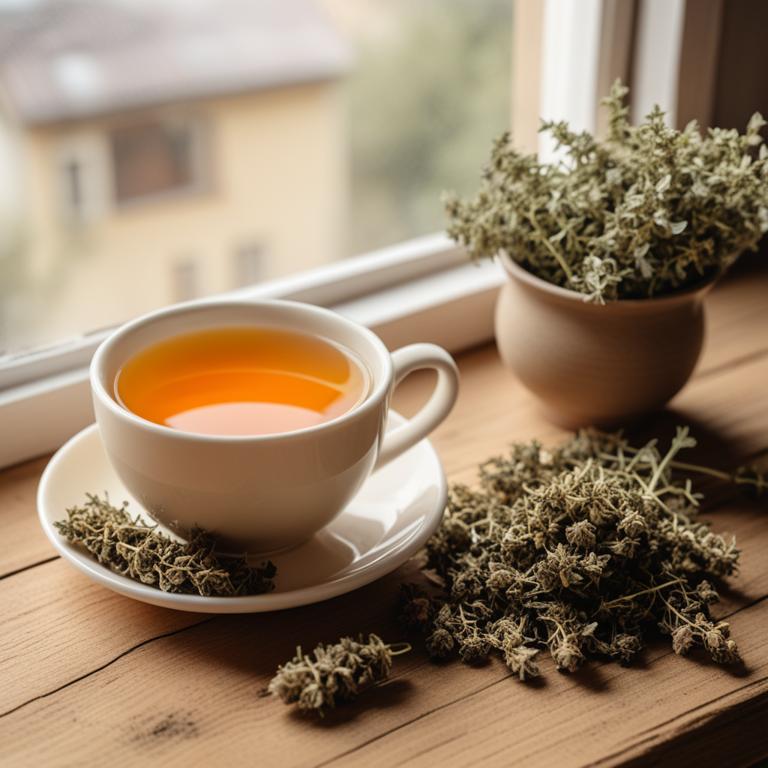
Herbal teas for Throat irritation are a natural and effective remedy that involves brewing herbs to create a soothing, non-caffeinated beverage that helps to alleviate discomfort and inflammation in the throat.
These teas are often used to treat various types of throat irritation, including sore throats, allergies, and colds, and offer numerous benefits, including reducing inflammation, calming the throat, and providing antioxidant properties.
Some popular herbal teas used to treat throat irritation include peppermint tea, which helps to loosen mucus and reduce inflammation, ginger tea, which has anti-inflammatory properties that can help to soothe the throat, chamomile tea, which calms the throat and promotes relaxation, eucalyptus tea, which helps to reduce congestion and inflammation, and licorice root tea, which has anti-inflammatory properties that can help to soothe the throat and reduce swelling.
Additionally, other herbal teas such as lemon balm tea, sage tea, and thyme tea are also effective in treating throat irritation due to their antibacterial and anti-inflammatory properties.
According to "Journal of alternative and complementary medicine (New York, N.Y.)", teas for throat irritation, specifically Throat Coat, a traditional demulcent herbal tea, have been found to be significantly superior to a placebo in providing rapid, temporary relief of sore throat pain in patients with pharyngitis.
Below there's a list of the 13 best herbal teas for throat irritation.
- 1. Thymus vulgaris teas
- 2. Glycyrrhiza glabra teas
- 3. Eucalyptus globulus teas
- 4. Andrographis paniculata teas
- 5. Glycyrrhiza uralensis teas
- 6. Echinacea purpurea teas
- 7. Zingiber officinale teas
- 8. Sambucus nigra teas
- 9. Rosmarinus officinalis teas
- 10. Cymbopogon citratus teas
- 11. Camellia sinensis teas
- 12. Lavandula angustifolia teas
- 13. Pimenta dioica teas
Also you may be interested in...
TODAY'S FREE BOUNDLE
Herb Drying Checklist + Herbal Tea Shopping List + Medicinal Herbs Flashcards
Enter you best email address below to receive this bundle (3 product valued $19.95) for FREE + exclusive access to The Aphotecary Letter.
$19.95 -> $0.00
1. Thymus vulgaris teas

Thymus vulgaris teas, also known as thyme tea, have been traditionally used to treat throat irritation ailments such as sore throats and coughs.
The anti-inflammatory and antimicrobial properties of thymus vulgaris teas help to reduce inflammation and combat infections in the throat, providing relief from irritation and discomfort.
The bioactive constituents of thymus vulgaris teas, including thymol and carvacrol, possess antibacterial and antiviral properties that help to inhibit the growth of pathogens and promote healing.
The benefits of using thymus vulgaris teas to treat throat irritation include natural pain relief, reduced inflammation, and a soothing effect on the throat, making it an effective and safe herbal remedy.
Related Study
According to "Ceska a Slovenska farmacie : casopis Ceske farmaceuticke spolecnosti a Slovenske farmaceuticke spolecnosti", Thymus vulgaris teas may be beneficial in treating throat irritation due to its antibacterial and antiseptic effects.
2. Glycyrrhiza glabra teas

Glycyrrhiza glabra teas, also known as licorice root tea, have been used for centuries to treat throat irritation due to their soothing and anti-inflammatory properties.
The saponins and flavonoids present in this herbal preparation help to calm the mucous membranes, reducing inflammation and discomfort associated with throat irritation.
The bioactive constituents, including glycyrrhizin and licochalcone, exhibit potent anti-inflammatory and antioxidant activities, contributing to the tea's therapeutic effects.
By using Glycyrrhiza glabra teas to treat throat irritation, individuals can experience relief from symptoms, such as soreness and discomfort, and promote overall well-being.
Related Study
According to "Journal of the Medical Association of Thailand = Chotmaihet thangphaet", Glycyrrhiza glabra teas for throat irritation have shown antimicrobial activity, particularly inhibiting S. pyogenes, the most common cause of acute pharyngitis, with MIC and MBC values of 39 and 78 μg/ml, respectively.
3. Eucalyptus globulus teas

Eucalyptus globulus teas have been traditionally used to treat throat irritation, a common ailment caused by coughing, smoking, or exposure to pollutants.
The anti-inflammatory and expectorant properties of this herbal preparation help to soothe the throat and clear out mucus, thereby providing relief from discomfort and pain.
The bioactive constituents of eucalyptus globulus, including eucalyptol and flavonoids, are responsible for its therapeutic effects, which help to reduce inflammation and fight off infections.
By drinking eucalyptus globulus tea, individuals can experience the benefits of a soothing and calming treatment for their throat irritation, promoting a speedy recovery and preventing complications.
Related Study
According to "African journal of traditional, complementary, and alternative medicines : AJTCAM", Eucalyptus globulus teas are among the most cited natural remedies by the traditional community for the treatment of symptoms associated with acute respiratory infections in children, including sore throat.
4. Andrographis paniculata teas
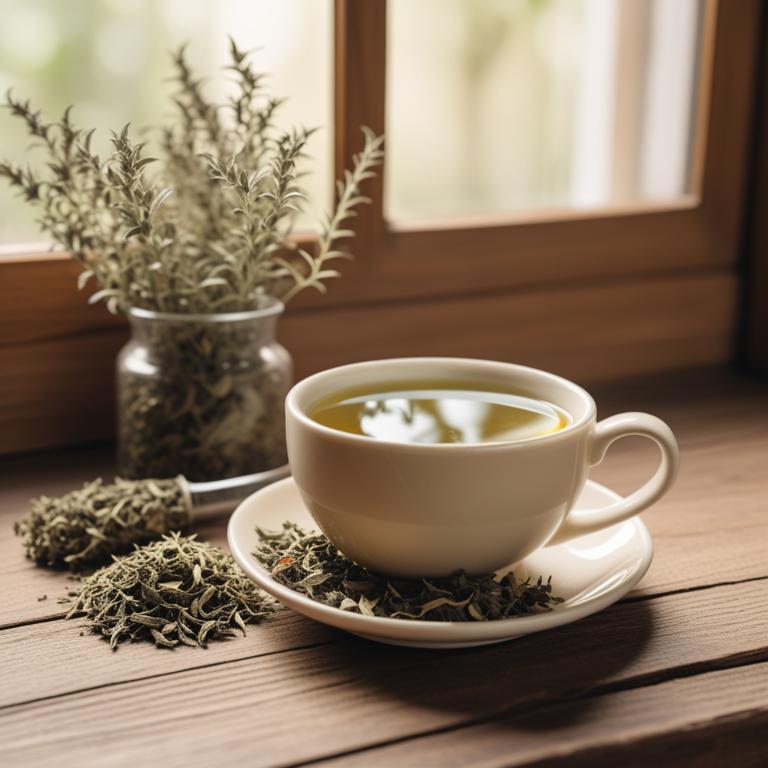
Andrographis paniculata teas have been traditionally used to treat throat irritation due to their anti-inflammatory and antimicrobial properties.
These properties help to reduce inflammation and combat infections that cause throat irritation, providing relief from discomfort and pain.
The bioactive constituents of Andrographis paniculata, including andrographolide and neoadrographolide, have been shown to exhibit potent anti-inflammatory and antimicrobial effects, contributing to its therapeutic benefits.
By consuming Andrographis paniculata teas, individuals can experience relief from throat irritation and promote overall respiratory health, making it a popular herbal remedy for soothing sore throats.
Related Study
According to Phytomedicine: international journal of phytotherapy and phytopharmacology, Andrographis paniculata teas showed the most significant improvement in treating throat symptoms and signs.
5. Glycyrrhiza uralensis teas
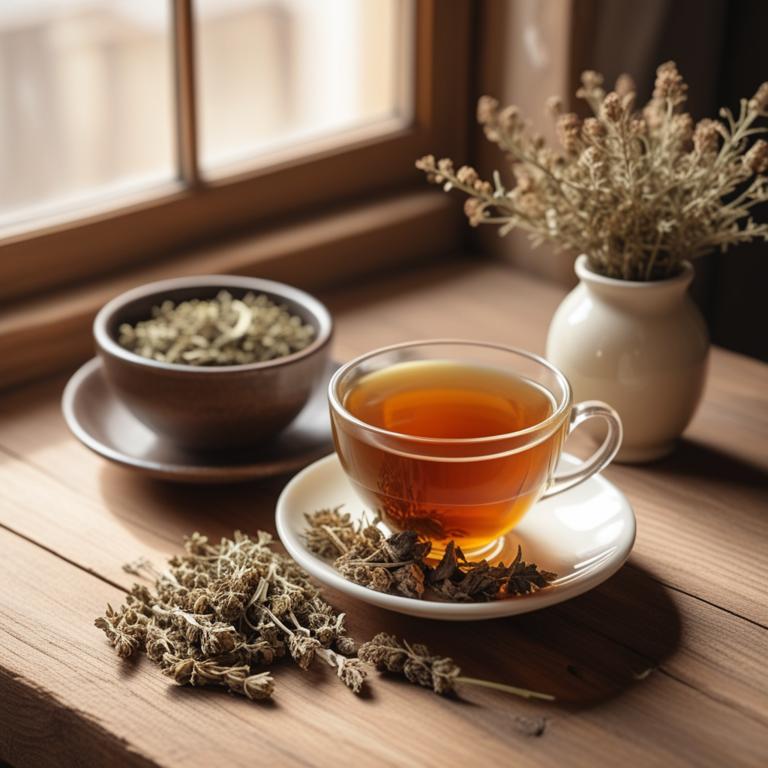
Glycyrrhiza uralensis teas, a traditional herbal remedy, have been used to treat throat irritation ailment due to its anti-inflammatory and soothing properties.
The bioactive constituents present in this herbal preparation, such as glycyrrhizin and flavonoids, help to reduce inflammation and promote healing of the mucous membranes in the throat.
By reducing inflammation and promoting healing, Glycyrrhiza uralensis teas help to alleviate symptoms of throat irritation, such as soreness and discomfort, and provide quick relief from the ailment.
The benefits of using Glycyrrhiza uralensis teas to treat throat irritation include reduced inflammation, improved healing, and a decrease in the occurrence of throat irritation episodes.
Related Study
According to the study, Glycyrrhiza uralensis teas, as part of the botanical lozenges, showed a significant improvement in symptoms of pharyngeal itching (73.81%), dry throat (67.50%), pharyngeal foreign body sensation (67.57%), aggravation due to excessive speaking (65.22%), and congestion of pharyngeal mucosa (44%) in patients with chronic pharyngitis.
6. Echinacea purpurea teas

Echinacea purpurea teas have been traditionally used to treat throat irritation, a common ailment caused by inflammation and infection.
This herbal preparation helps to treat throat irritation by reducing inflammation and modulating the immune system, thus alleviating symptoms such as soreness, redness, and swelling.
The bioactive constituents of Echinacea purpurea teas, including alkylamides, caffeic acid derivatives, and glycoproteins, play a crucial role in reducing inflammation and enhancing the body's natural defense against infection.
The benefits of Echinacea purpurea teas in treating throat irritation include rapid relief from symptoms, reduced risk of complications, and a lower likelihood of antibiotic resistance, making it a popular natural remedy for this condition.
Related Study
According to "Recent patents on biotechnology", Echinacea purpurea teas may exhibit potential for symptomatic relief in respiratory conditions, including throat irritation.
7. Zingiber officinale teas

Zingiber officinale teas, also known as ginger tea, have been traditionally used to treat throat irritation ailments due to their anti-inflammatory and antibacterial properties, which help to soothe and calm the irritated mucous membranes.
The bioactive constituents of ginger tea, such as gingerols and shogaols, possess potent antioxidant and anti-inflammatory properties that help to reduce swelling and pain in the throat.
By reducing inflammation and promoting healing, ginger tea can help to alleviate symptoms of throat irritation, such as soreness and discomfort, and promote a faster recovery.
The benefits of using ginger tea to treat throat irritation include its natural and non-addictive properties, as well as its ability to provide quick relief from symptoms, making it a popular natural remedy for this common ailment.
Related Study
According to the study in "Journal of ethnopharmacology", Zingiber officinale teas for throat irritation may have potential benefits due to the presence of compounds like lariciresinol, which was found to inhibit efflux pumps and increase the antimicrobial potency of berberine, a compound that has been traditionally used to treat respiratory disorders including throat infections.
8. Sambucus nigra teas

Sambucus nigra teas have been used for centuries to treat throat irritation, a common symptom of colds, flu, and other respiratory infections.
This herbal preparation's anti-inflammatory and antimicrobial properties help to soothe and calm the irritated throat, reducing swelling and discomfort.
The bioactive constituents, including flavonoids, phenolic acids, and triterpenoids, work together to combat bacterial and viral infections, while also reducing inflammation and promoting healing.
By drinking Sambucus nigra teas, individuals can experience relief from throat irritation and other respiratory issues, benefiting from its natural and non-addictive properties.
Related Study
According to "Journal of alternative and complementary medicine (New York, N.Y)", Sambucus nigra teas, found in Throat Coat, significantly reduced the intensity of throat pain when swallowing and provided rapid, temporary relief of sore throat pain in patients with pharyngitis.
9. Rosmarinus officinalis teas

Rosmarinus officinalis teas, derived from the leaves of the rosemary plant, have been traditionally used to treat throat irritation and soothe inflammation in the mucous membranes.
The anti-inflammatory and antimicrobial properties of this herbal preparation help to reduce swelling and combat the underlying infection that causes throat irritation.
Bioactive constituents such as carnosic acid, rosmarinic acid, and caffeic acid in Rosmarinus officinalis teas exhibit antioxidant and anti-inflammatory activities, which contribute to their therapeutic effects.
The benefits of using Rosmarinus officinalis teas to treat throat irritation include rapid relief from discomfort, reduced risk of complications, and a soothing, calming effect on the irritated mucous membranes.
10. Cymbopogon citratus teas
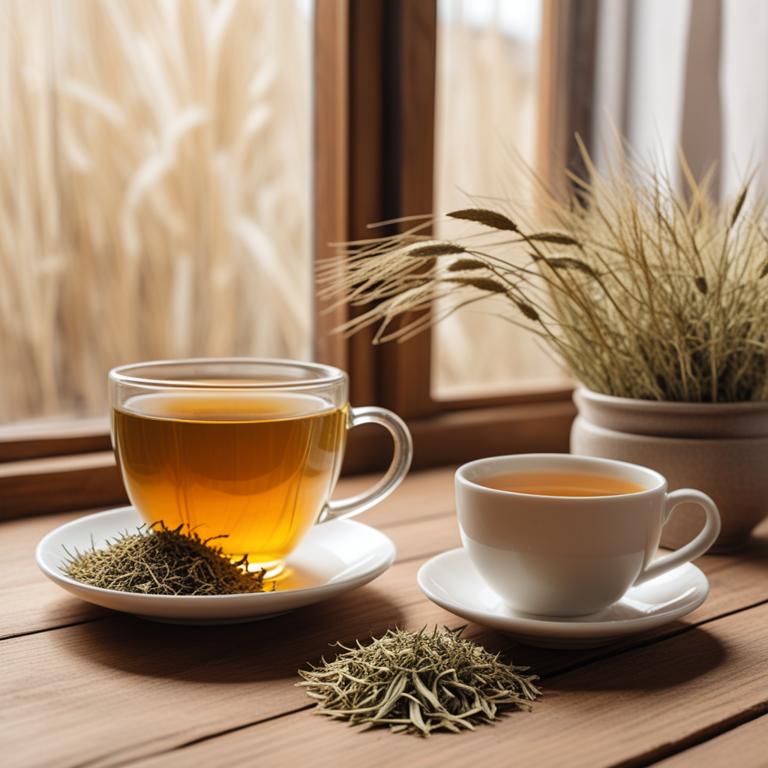
Cymbopogon citratus teas, also known as lemon grass tea, have been traditionally used to treat throat irritation due to its anti-inflammatory, antibacterial, and antifungal properties.
These properties help to soothe and calm the irritated throat, reducing inflammation and discomfort.
The bioactive constituents of Cymbopogon citratus teas, such as citral, limonene, and beta-pinene, exhibit their therapeutic effects by reducing inflammation, killing bacteria and fungi, and relaxing the throat muscles.
The benefits of using Cymbopogon citratus teas to treat throat irritation include rapid relief from symptoms, prevention of further irritation, and a soothing and calming effect on the throat.
Related Study
According to "Journal of ethnopharmacology", Cymbopogon citratus teas may be used to treat sore throat due to its traditional application records indicating its use for treating tracheitis and other respiratory issues.
11. Camellia sinensis teas
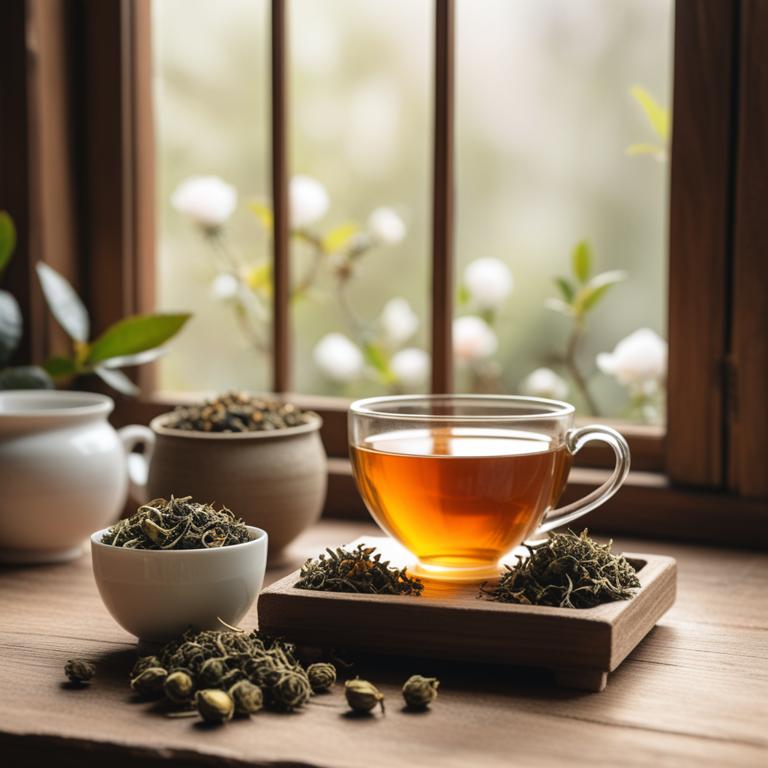
Camellia sinensis teas have been traditionally used to treat throat irritation ailments due to their anti-inflammatory and antimicrobial properties, which help to soothe and protect the mucous membranes.
The herbal preparation contains bioactive constituents such as catechins, theaflavins, and thearubigins, which possess antioxidant and anti-inflammatory activities that aid in reducing throat irritation and promoting healing.
By consuming Camellia sinensis teas, individuals can experience relief from throat irritation symptoms, such as pain, swelling, and redness, as well as a reduction in the risk of developing secondary infections.
The benefits of using Camellia sinensis teas to treat throat irritation include reduced inflammation, improved wound healing, and a decrease in the severity and duration of symptoms, making it a natural and effective remedy for this common ailment.
Related Study
According to "Journal of biological regulators and homeostatic agents", Camellia sinensis teas for throat irritation are beneficial due to their high antioxidant capacity, particularly the methanolic extract of Camellia sinensis which showed a significant radical scavenging activity with 78.95±7.12% DPPH assay.
12. Lavandula angustifolia teas

Lavandula angustifolia teas, commonly known as English lavender tea, have been used to treat throat irritation due to their soothing and anti-inflammatory properties.
The herbal preparation helps to treat this ailment by reducing inflammation and promoting relaxation, which in turn calms the throat and provides relief from discomfort.
The bioactive constituents of Lavandula angustifolia, including linalool and linalyl acetate, contribute to its therapeutic effects by exhibiting antimicrobial and anti-inflammatory properties that help to combat infection and reduce pain.
The benefits of using Lavandula angustifolia teas to treat throat irritation include a rapid reduction in symptoms, improved sleep quality, and a decrease in the risk of complications associated with chronic throat irritation.
13. Pimenta dioica teas

Pimenta dioica teas, also known as bay leaf teas, have been used to treat throat irritation due to their anti-inflammatory and soothing properties.
This herbal preparation helps to treat the ailment by providing relief from discomfort and pain, reducing inflammation and swelling in the throat area.
The bioactive constituents of Pimenta dioica teas, including eugenol and beta-caryophyllene, have been shown to have antioxidant and anti-inflammatory effects, which contribute to their therapeutic benefits.
The benefits of Pimenta dioica teas in treating throat irritation include their ability to calm the throat, reduce coughing, and promote a speedy recovery, making them a natural and effective remedy for this common ailment.
Related Study
According to "Journal of alternative and complementary medicine (New York, N.Y.)", Pimenta dioica teas, as part of the Throat Coat herbal tea blend, were found to significantly reduce the intensity of throat pain when swallowing, providing a rapid, temporary relief of sore throat pain in patients with pharyngitis.